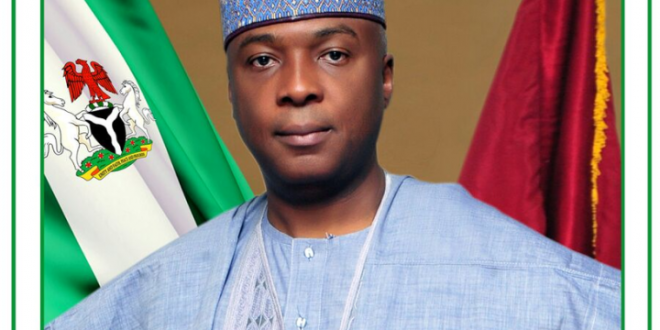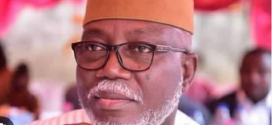Now that Saraki has been ‘convicted’ by the LAST week must have been the lowest point in Senator Bukola Saraki’s political career. Quite literally speaking, he was dragged to the market square, denuded, and sprayed with opprobrium so thick that his traducers would hope never washes off. As the prosecution chief witness reeled out fantastic stories of serial cash lodgements and illegal salary earnings, everyone gasped in disbelief. Powered by the social media, the stories leapt across boundaries within seconds. As the stories were retold and re-circulated, they grew weirder and wilder. Cash lodgements totalling N70 million became N70 million paid into Saraki’s account 70 times in one day! Some said it was actually $70 million dollars paid into his account 50 times in a day. People brought out their calculators to multiply 70 million by 50, still the sheer absurdity of the result did not clear their minds. As the stories grew wilder, public anger against Saraki grew in geometric proportion. He was brutally savaged in the social media, ridiculed in the newspapers, cursed in the market places, abused in motor parks, and mocked by his political enemies. It was a timely diversion for a country brought to its knees by fuel scarcity. To an anguished people who have to rely on the black markets to keep their lives going, this was a comic relief. The Saraki story became the new tales by moonlight! If this was all that Saraki’s political opponents set out to achieve; they have done a good job so far. Never before has a number three citizen in the land been so publicly humiliated. In fact, it is difficult now not to think that the damaging testimony of the prosecution witness was an end by itself; calculated as it were, to achieve this very objective of eroding the Saraki brand. Anyone familiar with court proceedings would clearly see that what happened at the tribunal last week was more evocative of an inquisition, programmed to pander to the mob, rather than a trial meant to serve the cause of justice. What became clear also was that Saraki is on trial in two courts: the court of law and the court of the mob. Even as the trial at the court of law is still at a very early stage, he has already been found guilty and condemned in the court of public opinion. As one commentator noted last week, the prejudicial value of the prosecution’s story overwhelms its probative value; but who cares! The prosecution counsel, Rotimi Jacobs is a very smart lawyer. He knows his case rests on a very weak foundation. Therefore, if the only conviction he is able to get in the end were in the media and the motor parks, the mission would have been accomplished. In his testimonies so far, what the prosecution witness has failed to show was how his stories relate to asset declaration offences for which Saraki was charged. At best, the link between his testimonies so far and the charges remains circumstantial. Assuming it was true that 50 lodgements were made into an account in one day, this would appear suspicious on the face of it, but it does not prove anything. It is certainly not a crime for anyone to choose to make 100 payments into his account in one day, if he so decides. What is potentially criminal was how he acquired the money, not how it was paid into an account. So far, the witness has only succeeded in instigating the public and exciting mob imagination with suggestive stories and conspiracy theories, without proving any case of wrongdoing. Perhaps more significantly, we should ask what the issue of Saraki collecting salaries after leaving office has to do with assets declaration. Was the prosecution trying to prove that the half a million naira or so that he was allegedly receiving as salaries after leaving office was used to acquire the assets under trial or in off-setting some of the loans he was said to have taken? This particular aspect of the testimony was nothing but sheer mischief, targeted at damaging him in his home state and nothing more. Interest in justice Otherwise, one should ask, which of the 13 charges against him does it apply to? This case therefore, is like dragging a man before a court for sleeping with another man’s wife, then proceed to argue that he stole money. Then when you were asked how the two were related, you say oh, you were just trying to prove that it was the stolen money that he used in enticing the woman. Anyone interested in justice should still ask for what offence exactly you were charging him. Many have wondered why Saraki’s lawyers have failed to raise objections to some of the stories told by the prosecution witness, especially when they all seemed to have bordered on allegations of financial crime rather than assets declaration. Even though they noted that they reserved their objections to the time of cross-examination, my guess is that they had been caught unawares. They must have come to the tribunal ready to defend a case of asset declaration and not to prove that their client was not a money launderer. They must have come to the Code of Conduct Tribunal to hear how the Code of Conduct Bureau conducted its investigations into Saraki’s assets and how they came to the conclusion that he had not fully declared his assets, only to be confronted by EFCC agent reeling out investigations allegedly conducted by the EFCC. They must also have wondered whether the case was an EFCC case or a Code of Conduct Bureau case; and why, if it was a case of financial crime, they were not at a high court where cases of financial malpractices should ordinarily be tried, instead of a Tribunal. Saraki has been shouting that his case was political, but his lawyers must have assured him they could get him justice in the courts; now they should know better. Jonathan Swift, said truth limps, while falsehood flies. Truth would eventually catch up, but by the time it does, falsehood would have done its damage and truth’s victory would at best be puerile. Could be that by the time Saraki’s lawyers begin cross examination, they would be able to destroy the stories of the prosecution witness, and quite improbably under this political circumstance, even get their clients off the hooks; but the damage to Saraki would have been done. This is the mortal danger of trial by the mob; it runs counter to the natural cause of justice: the guilt of the accused, rather than his innocence is presumed. All Saraki’s political opponents that are gloating at his travails should however realise that what is being set before our eyes, is a very dangerous precedence. This is not Saraki on trial, but the entire political elite. Mr. Danladi Umar said he made a mistake in dismissing the case against Bola Ahmed Tinubu in 2011, and therefore could not apply the same standard of justice in the case of Saraki; all well and good. What is certain is that a Pharaoh would mount the throne someday soon, who would not know any Joseph; and all chickens would come home to roost! Perhaps, what is also unprecedented about Saraki’s trial is the overwhelming support he had received from his colleagues in the Senate. Under president Obasanjo alone, we had five Senate Presidents: Evan Enwerem, Chuba Okadigbo, Anyim Pius Anyim, Adolphus Wabara and Ken Nnamani. Some were removed with ignominy for no apparent infraction other than refusal to do the bidding of the Executive. The current class of Senators must have been familiar with recent history of leadership instability in the Senate and how the highest law making body in the land could easily be turned into an appendage of the executive. I do not think that any of them who are standing with Saraki are doing so because they think he is a saint. What has been clear to them from the beginning however was that this particular trial is not about corruption. In fact, it is not even essentially about Saraki. What is on trial is the very independence of the Senate and its right to freely choose its own leadership. Those who want to get Saraki out must have calculated that all they needed to do was to tarnish him as much as they could so that the Senators would not even want to touch him. They have been gravely mistaken. They have failed to take into account that this is the most educated set of Senators we have had in a long time, if not ever. They could easily see though the subterfuge; and that is why even as he was being roundly vilified by the public last week, Senators were still insisting that he remains their only choice as Senate president. However, by so declaring, the Senators were not demonstrating their loyalty to Saraki, but to the principle that is necessary for the preservation of our democracy. I could see that some have started circulating text messages that Saraki should resign. They said a certain Prime Minister of a certain country had resigned after he was mentioned in the Panama papers. What they fail to add however, was that the said Prime Minister resigned because he admitted to a wrongdoing. Pray, what wrongdoing has Saraki admitted to? What wrongdoing has he been convicted for? So, why should he resign? Still, the argument remains that we must not allow politicians to achieve through the courts, what they failed to achieve on the political field. In the end, it is our hard-earned democracy that is on trial. No one, therefore should weep for Saraki; for the bell tolls for us all. Tope Ajayi writes from Abuja

 Hottestgistnaija.com
Hottestgistnaija.com



